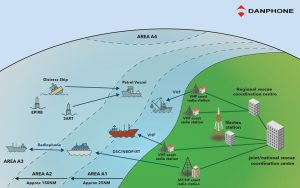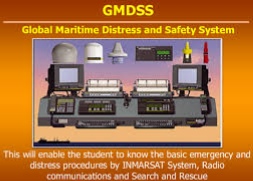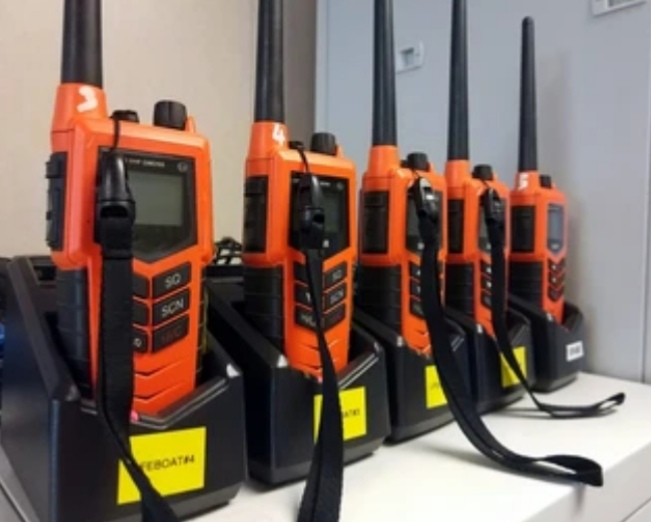The GMDSS Radio Log Book (the radio log) should be kept in a location close to the radio station.
The radio log, and associated records, must be kept onboard for at least 2 years.
The Master must nominate one or more crew members, normally the person/s qualified for distress and safety radio communications, to maintain the radio log and to carry out the tests and checks of the equipment required .
The radio log must contain a summary of communications relating to distress, urgency and safety messages. The summary must include dates and times in Coordinated Universal Time (UTC), details of the vessels involved and their positions.
Distress alerts and distress-related communications received as hard copy via INMARSAT satellite systems, NAVTEX or Narrow Band Direct Printing, VHF or MF/HF DSC should be noted in, and kept with, the log. Hard copy weather reports and navigation warnings need not be retained, but their receipt must be noted in the radio log, if not recorded in electronic form.

Electronic records of communications relating to distress, urgency, safety and receipts of weather reports, and navigation warnings, form part of the log, and must be retained and not overwritten.
Read Also : Top List Of Best Companies For Visa Sponsorship Jobs In Canada
Details of commercial communications exchanged via GMDSS communications equipment may also be recorded in the radio log.
Tests:
Tests and checks of equipment and reserve power at intervals specified by the equipment manufacturer must be entered into the log. A summary of the operational capability of the equipment, together with the names of any station contacted during tests, should be recorded. If any of the radio equipment is found not to be operating satisfactorily, the Master must be notified and details of the deficiencies recorded in the log.
Note: The tests and checks of equipment may include daily, weekly or monthly tests. The operating manuals for the equipment should provide guidance on what tests and checks are recommended.
Guidelines
1) Requirements ;
A record shall be kept, to the satisfaction of the Administration and as required by the Radio Regulations, of all incidents connected with the radio communication service which appear to be of importance to safety of life at sea. (SOLAS Reg. IV/17 & ITU RR App. 11)
2) Daily Entries (STCW A & B-VIII)
(a) The proper functioning of the DSC equipment shall be tested at least once each day but without radiating any signal.
(b) Inmarsat-C with EGC function Test: Self-test shall be tested by means provided.
(c) Batteries shall be tested ON-LOAD and OFF-LOAD daily, and where necessary, brought to fully charged condition.
3) Weekly Entries (STCW A & B-VIII)
(a) DSC distress and safety radio equipment shall be tested at least once each week by means of a test call when within communication range or coast station.
(b) Batteries shall be tested once per week by means of hydrometer where practicable, or where a hydrometer cannot be used (sealed batteries) by suitable load test.

Reference: Testing Equipment Used for Distress and Safety Calls. (IMO)
Testing on the exclusive DSC distress and safety calling frequencies should be avoided as far as possible by using other methods, There should be no test transmissions on the DSC calling channel on VHF Ch. 70.
Read Also : A Comprehensive And Complete Guide On How To Applying For USA Visa
However, when testing on the exclusive DSC distress and safety calling frequencies on MF and HF is unavoidable, it should be indicated that these are test transmission.
The test call should be composed in accordance with Recommendation ITU-R M.493 and the call should be acknowledge by the coast station. Normally there would be no further communication between the two station involved.
4) Monthly Entries (STCW A & B-VIII)
(a) Each search and rescue radar transponder shall be checked at least once a month using the in built test facility and checked for security and sign damage. (SOLAS Reg. III/19)
(b) Each survival craft two-way VHF equipment shall be tested at least once a month on a frequency other than VHF Ch. 16. (SOLAS Reg. III/19)
(c) Inmarsat-C with EGC shall be tested by means of actual communication.
(d) Batteries shall be checked once per month for the security of each battery and its connection and the condition of the batteries and their compartment or compartments.
5) Logging Navtex Messages
The reception of weather forecasts or navigational warnings on NAVTEX need not be noted in the GMDSS RADO LOG BOOK the NAVETX receiver print-out may replace the log entries required by chapter IV of the 1974 SOLAS Convention. (IMO Res. A. 617 (15).


